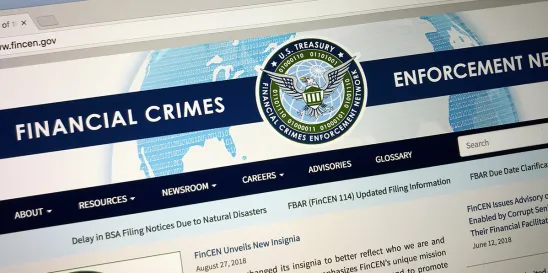Starting Jan. 1, 2024, the Corporate Transparency Act and its implementing regulations mandate that certain U.S. legal entities and foreign entities registered to do business in the United States (collectively, Reporting Companies) report certain BOI to the U.S. Department of the Treasury’s Financial Crimes Enforcement Network (FinCEN). According to FinCEN, this reporting requirement is intended to enhance the ability of FinCEN and other agencies to protect the U.S. financial system from illicit use, bringing the United States in line with at least 30 other countries that have implemented some form of central register of BOI.
Beneficial ownership reporting requirements took effect Jan. 1, 2024.
Which Entities Must Report BOI?
The following entities fall within the scope of the CTA and must report BOI to FinCEN, unless exempt:
| • | Domestic Reporting Companies: Any corporation, limited liability company (LLC), or other similar entity created by the filing of a document with a secretary of state or similar office of a state or Indian tribe. |
| • | Foreign Reporting Companies: Any corporation, LLC, or other entity formed under the laws of a foreign country registered to do business in any U.S. state or tribal jurisdiction by the filing of a document with a secretary of state or any similar office. |
In a factsheet FinCEN published concurrently with the BOI Reporting Rule, FinCEN stated it expects these reporting companies to include limited liability partnerships, limited liability limited partnerships, business trusts, and most limited partnerships, in addition to corporations and LLCs, as such entities are generally created by a filing with a secretary of state or similar office.
Reporting Company Exemptions: Twenty-three (23) types of entities are exempt from the definition of “Reporting Company” (each an “Exempt Entity”). These include:
| • | Issuers of a class of securities registered under section 12 of the Securities Exchange Act of 1934 or that are required to file supplementary and periodic information under section 15(d) of the Securities Exchange Act of 1934; |
| • | large operating companies, which include any entity that (i) employs more than 20 employees on a full-time basis in the United States; (ii) filed in the previous year federal income tax returns in the United States demonstrating more than $5,000,000 in gross receipts or sales, excluding gross receipts or sales from sources outside the United States; and (iii) has an operating presence at a physical office within the United States. |
| • | entities already required to disclose BOI publicly or to federal regulators – e.g., banks, credit unions, depository institution holding companies, insurance companies, registered money services businesses, broker/dealers, investment companies, investment advisers, certain venture capital fund advisers, and exchange or clearing agencies; |
| • | pooled investment vehicles operated or advised by a bank, a credit union, a broker/dealer, an investment company or investment advisor, or an exempt venture capital fund advisor; |
| • | registered entities as defined in section 1a of the Commodity Exchange Act, including futures commission merchants, introducing brokers, swap dealers, major swap participants, commodity pool operators, or commodity trading advisors; |
| • | public accounting firms registered in accordance with section 102 of the Sarbanes-Oxley Act of 2002; |
| • | state-licensed insurance producers subject to supervision by the insurance commissioner or a similar official or agency of a U.S. state and that have an operating presence at physical offices within the United States; |
| • | certain tax-exempt entities, including (i) 501(c)-tax exempt entities, (ii) political organizations, as defined in section 527(e)(1) of the U.S. Internal Revenue Code (Code), and (iii) trusts described in paragraph (1) or (2) of section 4947(a) of the Code, and entities that operate exclusively to provide financial assistance to, or hold governance rights over, the tax-exempt entities listed in this paragraph; |
| • | certain subsidiaries of exempt entities, i.e., any entity whose ownership is controlled or wholly owned, directly or indirectly, by an Exempt Entity, except the subsidiaries of (i) money services businesses, (ii) pooled investment vehicles, (iii) entities that assist a tax-exempt entity, and (iv) inactive entities. |
Clarifications to the ‘Large Operating Company’ Exemption
With respect to the “large operating company” exemption, FinCEN has clarified the following:
| • | Full-time employee: Companies may not consolidate employee headcount across affiliated entities; the entity in question must have the requisite 21 or more full-time employees, as defined by the Internal Revenue Service. |
| • | Federal Income Tax Filing: The requisite $5,000,000 threshold for gross sales or receipts must have been reported on the reporting entity’s prior year IRS Form 1120, consolidated IRS Form 1120, IRS Form 1120-S, IRS Form 1065, or other applicable IRS form, excluding gross receipts or sales from sources outside the United States, as determined under federal income tax principles. |
| • | United States Presence: Under the BOI Reporting Rule, an entity with an “operating presence at a physical office within the United States” is one for which a physical office is owned or leased by such entity, and that such office is physically distinct from the place of business of any other unaffiliated entity. |
Who Is a ‘Beneficial Owner’?
Under the BOI Reporting Rule, a beneficial owner of a Reporting Company is “any individual who, directly or indirectly, exercises substantial control over such [R]eporting [C]ompany or owns or controls at least 25 percent of the ownership interests of such [R]eporting [C]ompany.” (Emphasis added.) “Substantial control,” “direct or indirect exercise of substantial control,” and “ownership interest” are defined as follows:
| • | Substantial Control: The BOI Reporting Rule sets forth a range of activities that could constitute substantial control of a Reporting Company, which captures an individual who: |
| — | holds the position or exercises the authority of a president, chief financial officer, general counsel, chief executive officer, chief operating officer, or any other officer, regardless of official title, who performs a similar function at the Reporting Company (each a “senior officer”); |
| — | has authority over the appointment or removal of any senior officer or a majority of the board of directors (or similar body); |
| — | directs, determines, or has substantial influence over important decisions made by the Reporting Company; or |
| — | has any other form of substantial control over the Reporting Company. |
| • | Direct or Indirect Exercise of Substantial Control: The BOI Reporting Rule clarifies that an individual may directly or indirectly, including as a trustee of a trust or similar arrangement, exercise substantial control over a Reporting Company through: |
| — | Board representation; |
| — | ownership or control of a majority of the voting power or voting rights of the Reporting Company; |
| — | rights associated with any financing arrangement or interest in a company; |
| — | control over one or more intermediary entities that separately or collectively exercise substantial control over a Reporting Company; |
| — | arrangements or financial or business relationships (formal or informal) with other individuals or entities acting as nominees; or |
| — | any other contract, arrangement, understanding, relationship, or otherwise. |
| • | Ownership Interest: An “ownership interest” in a Reporting Company is defined as: |
| — | Any equity, stock, or similar instrument; preorganization certificate or subscription; or transferable share of, or voting trust certificate or certificate of deposit for, an equity security, interest in a joint venture, or certificate of interest in a business trust; in each such case, without regard to whether any such instrument is transferable, is classified as stock or anything similar, or confers voting power or voting rights; |
| — | any capital or profit interest in an entity; |
| — | any instrument convertible, with or without consideration, into any share or instrument described in the preceding two clauses, any future on any such instrument, or any warrant or right to purchase, sell, or subscribe to a share or interest described in the preceding two clauses, regardless of whether characterized as debt; |
| — | any put, call, straddle, or other option or privilege of buying or selling any of the items described in the preceding three clauses (unless such option or privilege is created and held by a third party without the knowledge or involvement of the Reporting Company); or |
| — | any other instrument, contract, arrangement, understanding, relationship, or mechanism used to establish ownership. |
FinCEN regulations also provide certain methods to calculate whether an individual owns or controls at least 25% of the ownership interest of a Reporting Company, including:
| • | For corporations, entities taxed as corporations, and other entities that issue shares of stock, the applicable ownership percentage is calculated based on a “vote or value” approach, under which an individual’s percentage of ownership interests is the greater of (1) the total combined voting power of all classes of ownership interests of the individual as a percentage of total outstanding voting power of all classes of ownership interests entitled to vote or (2) the total combined value of the ownership interests of the individual as a percentage of the total outstanding value of all classes of ownership interests; and |
| • | for entities that issue capital and profit interests (including entities treated as partnerships for tax purposes), the individual’s total capital and profit interests are compared to the total outstanding capital and profit interests of the Reporting Company. |
Who Is Not a ‘Beneficial Owner’?
The BOI Reporting Rule exempts the following individuals from the definition of “beneficial owner”:
| • | A minor child; |
| • | an individual acting as a nominee, intermediary, custodian, or agent on behalf of another individual; |
| • | an individual acting solely as an employee of a Reporting Company (excluding senior officers); |
| • | an individual whose only interest in a Reporting Company is a future interest through a right of inheritance; and |
| • | creditors of a Reporting Company. |
Who Is a Company Applicant?
A “company applicant” is defined as the individual who directly files the document that forms a U.S. entity or first registers a foreign entity to do business in the United States. In addition, the individual primarily responsible for directing or controlling such filing is also considered a company applicant, if more than one individual is involved.
Notably, entities created before the effective date of Jan. 1, 2024, are not required to report company applicant information.
What Information Must be Reported?
Reporting Companies must submit to FinCEN an initial report identifying information for the Reporting Company itself, each of its beneficial owners and, for entities created after the Jan. 1, 2024, effective date, information of its company applicant(s). This initial report must include:
| • | Reporting Company: |
| — | the full legal name and any trade name or “doing business as” name of the Reporting Company; |
| — | the complete current address, which can be either (i) the street address of a Reporting Company with a principal place of business in the United States; or (ii) the street address of the primary location in the United States where the Reporting Company conducts business; |
| — | the state, tribal, or foreign jurisdiction of formation or initial registration of the Reporting Company; and |
| — | the Internal Revenue Service Taxpayer Identification Number (TIN) (including an Employer Identification Number (EIN)) of the Reporting Company or, for foreign Reporting Companies that have not been issued a TIN, a tax identification number issued by a foreign jurisdiction and the name of such jurisdiction. |
| • |
Beneficial Owners and Company Applicants1: .
|
| — | The full legal name of the individual; |
| — | the date of birth of the individual; |
| — | a complete current address consisting of (i) the street address of the business in the case of company applicants; or (ii) the individual’s residential street address for all other cases; |
| — | identifying information about, and a picture of, a current U.S. government ID (e.g., a passport or driver’s license) or, if none exists, a current foreign passport. |
FinCEN Identifiers
A FinCEN Identifier (FinCEN ID) is a unique identifying number that FinCEN will issue to individuals or Reporting Companies upon request, subject to certain conditions. For individuals, FinCEN will issue a FinCEN ID if an individual submits to FinCEN the same BOI as is required from a beneficial owner or company applicant (i.e., the individual’s full legal name, date of birth, current residential or business street address, a unique identifying number from an acceptable identification document and a copy of the identification document). A Reporting Company may submit an application for a FinCEN ID at or after the time the Reporting Company submits its initial report to FinCEN.
FinCEN will allow a Reporting Company to use an individual or entity’s FinCEN ID in lieu of providing BOI with respect to such individual or entity.
Important Filing Deadlines
Reporting Companies must comply with the following timeframes:
| • | Companies Existing/Registered Prior to Jan. 1, 2024: Domestic Reporting Companies created, or foreign Reporting Companies registered to do business in the United States before, Jan. 1, 2024, must file their initial report with FinCEN no later than Jan. 1, 2025. |
| • | New Companies Formed/Registered in 2024: Domestic Reporting Companies created, or foreign Reporting Companies registered to do business in the United States, on or after Jan. 1, 2024, and before Jan. 1, 2025, must file their initial report with FinCEN within 90 calendar days of the date when they are effectively created or registered. |
| • | New Companies Formed/Registered on or after Jan. 1, 2025: Domestic Reporting Companies created, or foreign Reporting Companies registered to do business in the United States, on or after Jan. 1, 2025, must file their initial report with FinCEN within 30 calendar days of the date when they are effectively created or registered. |
| • | Companies That Lose Their Exemption: Any entity that no longer meets the criteria to remain an Exempt Entity must file a report within 30 calendar days of the date when it no longer meets the criteria for an exemption. |
| • | Changes to Reported Information: Reporting Companies will have 30 calendar days to file an updated report if there is a change in the information previously reported to FinCEN. |
| • | Error Corrections: If a Reporting Company filed a report containing information that was inaccurate at the time of filing, and such information remains inaccurate, the Reporting Company must file a corrected report within 30 calendar days of the date it becomes aware, or has reason to know, that the information is inaccurate. |
Willful failure to comply with the reporting requirements of the BOI Reporting Rule may result in criminal and civil penalties, including $500 per day in civil monetary penalties and criminal penalties of a $10,000 fine, imprisonment for no more than two years, or both. According to the BOI Reporting Rule, a person is responsible for a willful violation of the reporting requirements if the person caused the failure to report or is a senior officer of the reporting entity at the time of the violation.
Conclusion
The CTA is now in effect, representing a groundbreaking shift in how the federal government monitors beneficial ownership of U.S. Reporting Companies. With an estimated 32.6 million companies expected to comply with the CTA, companies must be aware of the CTA’s broad applicability to entities within their structures. To prepare for compliance, reporting companies should familiarize themselves with the CTA’s requirements and establish internal processes for identifying and updating information on beneficial owners, including boards of directors, foreign affiliates, senior officers, and those controlling a company.
.
1 Special rules apply to the reporting of any individual who is a beneficial owner of a Reporting Company exclusively by virtue of that individual’s ownership interest in one or more Exempt Entities that have a direct or indirect ownership interest in the Reporting Company.




 />i
/>i

